Bölgesel Çalışmalar \ 2-2

Rusya Federasyonu'nda farklı kökenlere ait toplulukların kimlik oluşturma çabaları Sovyetler Birliği'nin dağılmasıyla birlikte yeniden gündeme gelse de bu çalışmaların doğuş zamanlarını Çarlık öncesi Rusya'ya kadar götürmek mümkündür.
Rusya'da Çokkültürlülük ve Tatar Kimliği isimli bu kitabın amacı; Rusya'nın çokkültürlülüğünü sorgulamak, Rusya'da çokkütürlülüğün teoride ve pratikte nasıl yorumlandığına bir cevap aramak ve Slav kültüründen sonra Rusya çokkültürlülüğünü en belirgin şekilde etkileyen ve zaman içerisinde kendisi de etkilenen Tatar kimliğini incelemektir. Bir nevi Rusya'da çokça kullanılan “Rus'u kazısanız altından Tatar çıkar.” deyişinin toplumsal gerçekliği ile Tatar Türklerinin Rusya'nın çokkültürlülüğüne etkileri incelenmiştir.
Ayrıca Rusya gibi çok milletli bir devletin sosyolojik açıdan araştırılması hem Rusya için hem de Tatar Türkleri ile tarihsel ve kültürel yakınlığı bakımından Türkiye için önemlidir. “Rusya akılla kavranmaz, genel kabul görmüş bir arşınla ölçülmez.” Bu sözlerin sahibi Tyutçev'in dediği gibi sahip olduğu büyük coğrafya ve çok milletli yapısı ile Rusya gibi bir ülkenin anlaşılması çok meşakkatli bir iştir. Ancak imkânsız da değildir.
Bu eser, hem sahada hem de akademik alanda verilen sekiz yıllık bir emeğin ürünüdür. Literatürde önemli bir boşluğu dolduracağına inanılan eserin, alanda yapılacak olan araştırmalara kaynaklık etmesi ve sahayı tanımak isteyen tüm okuyucalara yol gösterici olması ümit edilmektedir.
Rusya'da Çokkültürlülük ve Tatar Kimliği isimli bu kitabın amacı; Rusya'nın çokkültürlülüğünü sorgulamak, Rusya'da çokkütürlülüğün teoride ve pratikte nasıl yorumlandığına bir cevap aramak ve Slav kültüründen sonra Rusya çokkültürlülüğünü en belirgin şekilde etkileyen ve zaman içerisinde kendisi de etkilenen Tatar kimliğini incelemektir. Bir nevi Rusya'da çokça kullanılan “Rus'u kazısanız altından Tatar çıkar.” deyişinin toplumsal gerçekliği ile Tatar Türklerinin Rusya'nın çokkültürlülüğüne etkileri incelenmiştir.
Ayrıca Rusya gibi çok milletli bir devletin sosyolojik açıdan araştırılması hem Rusya için hem de Tatar Türkleri ile tarihsel ve kültürel yakınlığı bakımından Türkiye için önemlidir. “Rusya akılla kavranmaz, genel kabul görmüş bir arşınla ölçülmez.” Bu sözlerin sahibi Tyutçev'in dediği gibi sahip olduğu büyük coğrafya ve çok milletli yapısı ile Rusya gibi bir ülkenin anlaşılması çok meşakkatli bir iştir. Ancak imkânsız da değildir.
Bu eser, hem sahada hem de akademik alanda verilen sekiz yıllık bir emeğin ürünüdür. Literatürde önemli bir boşluğu dolduracağına inanılan eserin, alanda yapılacak olan araştırmalara kaynaklık etmesi ve sahayı tanımak isteyen tüm okuyucalara yol gösterici olması ümit edilmektedir.

Değerli okuyucular!
Rusya müthiş bir ülkedir. Kültürel kimliğinde 190’dan fazla etnik topluluk bulunmaktadır. Bunların çoğu tarihten itibaren var oldukları ana vatanlarında yaşıyorlar. Rusya’da farklı dil, inanç ve etnik yapıya sahip halklar kendi dillerini, geleneklerini ve göreneklerini korumakla kalmayıp, bunları gelecek nesillere aktarabilecek bir eğitim sistemi ile ülkenin kültürel zenginliğine katkıda bulunmaktadırlar.
2019 yılı, Rusya ve Türkiye’de karşılıklı olarak kültür ve turizm yılı olarak kutlanmaktadır. 2019 yılı içerisinde Türkiye Cumhuriyeti vatandaşları Rusya kültürü ve tarihine dair birçok etkinlik ile tanışma fırsatı bulacaklardır. Bu etkinlikler arasında konserler, sinema gösterileri, resim ve el sanatları sergileri vb. olacaktır. Tüm bu faaliyetler ile Rusya’nın kültürel zenginliğinin Türk toplumuna yansıması mümkün olabilir.
Okuyacağınız bu kitap Rusya Federasyonu etnik dünyasına rehberlik edecek ilgi çekici bir bilgi sunumuyla sizlere katkı yapacaktır. Bu kitabı okurken Rusya halklarının tarihi, dilleri, kültürleri, gelenekleri ve devlet ile olan ilişkilerini genel anlamda tanımış olacaksınız. Rusya coğrafyasını ve Rusya’yı anlamak istiyorsanız ancak o bölgede yaşayan halkların tarihini, siyasi, ekonomik ve kültürel gelişimini anlamakla ile işe başlamalısınız. Bu kitap size iyi bir rehber olacaktır.
Bu kitap Türk işadamlarına, siyasetçilere ve toplumun geneline Rusya’yı tanıma ve anlama konusunda faydalı olacaktır. Ayrıca, Rusya’nın tarihi geçmişini merak eden ve buna dair araştırmalar yapmak isteyen araştırmacılara, akademisyenlere, öğretmenlere ve öğrencilere de yeni bir başlangıç için ışık tutabilir.
Türkiye-Rusya işbirliğinin gelişmesine katkı yapması temennisiyle iyi okumalar dilerim.
Aleksey YERHOV - Rusya Federasyonu Türkiye Büyükelçisi
Rusya müthiş bir ülkedir. Kültürel kimliğinde 190’dan fazla etnik topluluk bulunmaktadır. Bunların çoğu tarihten itibaren var oldukları ana vatanlarında yaşıyorlar. Rusya’da farklı dil, inanç ve etnik yapıya sahip halklar kendi dillerini, geleneklerini ve göreneklerini korumakla kalmayıp, bunları gelecek nesillere aktarabilecek bir eğitim sistemi ile ülkenin kültürel zenginliğine katkıda bulunmaktadırlar.
2019 yılı, Rusya ve Türkiye’de karşılıklı olarak kültür ve turizm yılı olarak kutlanmaktadır. 2019 yılı içerisinde Türkiye Cumhuriyeti vatandaşları Rusya kültürü ve tarihine dair birçok etkinlik ile tanışma fırsatı bulacaklardır. Bu etkinlikler arasında konserler, sinema gösterileri, resim ve el sanatları sergileri vb. olacaktır. Tüm bu faaliyetler ile Rusya’nın kültürel zenginliğinin Türk toplumuna yansıması mümkün olabilir.
Okuyacağınız bu kitap Rusya Federasyonu etnik dünyasına rehberlik edecek ilgi çekici bir bilgi sunumuyla sizlere katkı yapacaktır. Bu kitabı okurken Rusya halklarının tarihi, dilleri, kültürleri, gelenekleri ve devlet ile olan ilişkilerini genel anlamda tanımış olacaksınız. Rusya coğrafyasını ve Rusya’yı anlamak istiyorsanız ancak o bölgede yaşayan halkların tarihini, siyasi, ekonomik ve kültürel gelişimini anlamakla ile işe başlamalısınız. Bu kitap size iyi bir rehber olacaktır.
Bu kitap Türk işadamlarına, siyasetçilere ve toplumun geneline Rusya’yı tanıma ve anlama konusunda faydalı olacaktır. Ayrıca, Rusya’nın tarihi geçmişini merak eden ve buna dair araştırmalar yapmak isteyen araştırmacılara, akademisyenlere, öğretmenlere ve öğrencilere de yeni bir başlangıç için ışık tutabilir.
Türkiye-Rusya işbirliğinin gelişmesine katkı yapması temennisiyle iyi okumalar dilerim.
Aleksey YERHOV - Rusya Federasyonu Türkiye Büyükelçisi

Dünyanın en önemli küresel aktörlerinden biri olan Rusya'nın Türkiye ile hem iş birliği hem de çatışma şeklinde ilerleyen ilişkilerinin en yoğun dönemine girdiği günleri yaşamaktayız. İki ülke arasındaki tarihî ilişkilerin, savaşların, siyasi krizlerin ve ticaretin ötesinde günümüzde Suriye üzerindeki mücadele, Ukrayna'nın işgali ve Türkiye'ye yoğun Rus göçü, S-400 krizi ve Türkiye'de Rusların nükleer santral inşası gibi sadece Türkiye'yi değil uluslararası toplumu da etkileyen güncel olaylar, Rusya üzerine Türkçe akademik çalışmalara ihtiyacı artırmaktadır. Türkiye'de sosyal bilimlerden Rusya üzerine odaklanan derleme kitap çalışması yok denecek kadar azdır. Var olanlar da, daha çok askerî ve diplomatik açıdan Türk-Rus ilişkilerini ele almıştır. Bu çalışma ise Rus toplumunu farklı yönleriyle interdisipliner bir perspektiften, farklı sosyal bilim dallarının birlikte sağladığı daha bütüncül bir bakış açısıyla analiz etmeyi amaçlamaktadır. Bu gayeyle bu derleme kitap projesi, bir yandan Türkiye ile Rusya arasındaki siyasi ve ekonomik ilişkileri hem geçmişini hem de günümüzü bütün boyutlarıyla ele alırken diğer yandan Orta Asya'daki Türkler, Rus otoriterizmi, 1917 Ekim Devrimi'nin sosyal teoriye etkisi, SSCB'de milliyetçilik ve göç politikaları gibi Rus toplumunun farklı boyutlarına da ışık tutmaktadır.

Sosyal bilimler alanında ortaya konulan çalışmalarda çoğunlukla tarih ve coğrafya disiplinlerine ait bulguların birbirinden bağımsız ve ilintisiz bir şekilde kullanıldığı ve yine bu iki disiplinin kesişim noktasını oluşturan siyasi coğrafya konusuna gerekli ve yeterli ilginin gösterilmediği müşahede edilmektedir. Tarih ve coğrafya disiplinlerine ait bulguların birbirleriyle ilişkilendirilmek suretiyle analiz edildiği bu monografik çalışmada, sıra dışı sınır konusu coğrafi fragmanlar üzerinden incelenmiştir. Bu çerçevede, uluslararası ilişkiler tarihinde önemli yer teşkil etmiş olan ve/veya teşkil eden otuz iki adet coğrafi fragman örneği, siyasi coğrafya ışığında jeopolitik perspektiften analiz edilmiştir. Uç topraklar, koridorlar, kıstaklar ve bölünmüş adalar şeklinde dört kategoride gruplandırılan bu coğrafi fragman örnekleri aynı zamanda tarihsel açıdan da incelemeye tabi tutulmuştur. Çalışmada Alaska, Caprivi, Wakhan, Tenasserim ve Transnistria uç toprakları; Petsamo, Zengezur, Danzig, Antofagasta, Dobruca, Kongo, Amazon, Eritre, Adriyatik, Eilat, Akabe, Ege, Trieste, Neum-Klek, Siliguri ve Gansu koridorları; Kra, Panama, Orta ve Doğu Avrupa ile Perekop kıstakları; Yeni Gine, Borneo, Éire, Timor, Ateş Toprakları, Hispaniola ve Kıbrıs adaları incelenmiştir.

The debates surrounding area studies, including sub-disciplines, spheres of analysis, research boundaries, and theoretical foundations, persist both as a discipline and a field of research. In Türkiye, this field is commonly referred to as area, regional, or field studies. It focuses on the examination and analysis of various regions, and its subjects are evolving along different regional lines. Besides the research and publications from the general to the specific and from the specific to the general, studies centred on certain states (e.g., Russia, Germany, Türkiye) that analyze their areas of geopolitical interest also make significant contributions to the relevant literature.
Recently, there has been a notable rise in the number of edited book studies focusing on regions like Africa, Asia, and Latin America, in addition to regions near Türkiye. Considering this trend, it is fair to assert that the book “South Asia: State, Society, and Politics” which is being presented here, stands as the pioneering work in this specific field of research.
Recently, there has been a notable rise in the number of edited book studies focusing on regions like Africa, Asia, and Latin America, in addition to regions near Türkiye. Considering this trend, it is fair to assert that the book “South Asia: State, Society, and Politics” which is being presented here, stands as the pioneering work in this specific field of research.

Ukrayna, sadece Batılların değil, aynı zamanda Türklerin de Hakkında Az bilgi Sahibi olduğu, Rusya ve Avrupa arasında geçiş bölgesi özelliği taşıyan ve stratejik önemi gün geçtikçe artan bir ülkedir. Ukrayna günümüzde Sovyet ruhuna ve Rusya Federasyonu'nun müdahalelerine karşı ciddi bir mücadele vermekte, liberal demokrasinin kurumlarını oluşturmak ve güçlendirmek hedefiyle toplumsal ve siyasal sorunlarını çözmeye çalışmaktadır. Bu bağlamda, bu kitap, Türk dilli okuyuculara Ukrayna hakkında kapsamlı bilgi sunmayı amaçlamaktadır. Şubat 2019-Haziran 2019 ve Ekim 2019’da, Kıyiv'de gerçekleştirilen saha araştırması verilerine dayanarak, sosyolojik bir perspektiften hareketle kaleme alınan bu çalışma, Sovyet sonrası dönemdeki toplumsal ve siyasal değişimi küresel dinamikler ışığında incelemektedir. Bu kitap. Ukrayna tarihinin dönüm noktalarını ve Sovyet dönemi baskılarını öne çıkarmanın yana sıra Sovyet sonrası dönemde din, kültür ve kimlik alanında yaşanan dönüşümleri, özellikle 2014'te Kırım'ın işgali ve yasa dışı ilhakı ile Donbas bölgesinde Rusya destekli ayrılıkçı grupların başlattığı ve hâlen devam eden savaşın Ukrayna toplumuna etkilerini kapsamlı bir şekilde irdelemiştir.
Prof. Dr. Ayşegül Aydıngün, Prof. Dr. İsmail Aydıngün
Prof. Dr. Ayşegül Aydıngün, Prof. Dr. İsmail Aydıngün

Suriye Türkmenleri, Suriye coğrafyasında yaşayan kadim halklardan biri olarak yedinci yüzyıldan itibaren bölgede varlık göstermektedir. Suriye topraklarında bin yılı aşkın süredir temel unsur olarak bulunan Türkmenler, tarihsel seyir içerisinde önce Fransızların akabinde Arap milliyetçiliğinin ve devamında ise Baas Partisinin yoğun baskı, tecrit ve asimilasyon politikalarına maruz bırakılmıştır. Suriye’de 2011 yılının Mart ayında başlayan Arap Baharı süreciyle, bölgedeki varlıkları yeniden dünya gündemine çıkan Türkmenler, iç savaş süreci içerisinde rejim ve müttefiklerinin uyguladıkları politikalar ile zorunlu bir göçe tabi tutulmuştur. Bu bağlamda, “Suriye İç Savaşı ve Suriye Türkmenleri” isimli çalışma, Suriye Türkmenlerinin iç savaş sonrası süreçte içerisinde bulundukları koşulları tarihsel bir perspektif ile ortaya koyarak Suriye Türkmenlerinin tanınmasına katkı sağlamak ve uluslararası platformlarda siyasi bir aktör olarak göz ardı edilen Türkmenlerin varoluş mücadelesinin temel eksiklerini akademik bir çalışma etrafında toplayarak analiz etmeyi amaçlamıştır. Kitap, genel hatlarıyla Suriye genel tarihi, Arap Baharı süreciyle başlayıp belirgin bir iç savaşa evrilen Suriye İç Savaşı’nın tarihsel gelişimi ve Suriye Türkmenlerinin iç savaş sürecindeki askerî, siyasi ve kültürel gelişmelerinin incelenmesi ve yeknesak hâlde okuyucuya sunulması amacıyla hazırlanmıştır.

Bu kitap; iki kadim geleneğin, iki farklı yerelin iki farklı kitlesel göçünü inceleme nesnesi yapmakta, aynı zamanda taşıdıkları benzerliklerden ve yaşanan deneyimlerden yola çıkarak bazı öngörülerde bulunmaktadır. Suriye kaynaklı kitlesel göçlerin Türk toplumunda bulduğu/bulacağı karşılığı ve ortaya çıkan/çıkma potansiyeli olan sorunsal alanları anlamak için İran'da Afganların 43 yıllık deneyimlerinden yola çıkarak Türkiye özelinde bazı sosyal ipuçları bulmayı çabalıyor.
Afganların İran'a yönelik ilk kitlesel göçü 1979 Sovyet İşgali ile başlamıştı. Bu ilk kitlesel hareketlilikte göç eden Afganlar “muhacir” olarak görülmüştü. Sovyet rejiminin zulmünden dolayı göç eden Afganlara İran açık kapı politikası uygulamıştı. İşgal sonrası İran'a göç eden Afgan mültecilerin çoğu, kırsal kesimdendi. İran'da tarım ve inşaat sektörlerindeki ucuz iş gücünün temel kaynağı olmuşlardı. İran'da doğan ikinci ve üçüncü kuşakların çoğunluğu ise Afganistan ile gönül bağı dışında bir bağ kuramamıştı. 1989 yılından itibaren İran'ın Afganlara yönelik politikaları değişmeye ve Afganlar, ekonomik ve sosyal sorunların kaynağı olarak görülmeye başlandı. Muhacir olarak karşılanan Afganlar sonraki süreçte “panahandegan” olarak görüldüler.
Suriyelilerin Türkiye'ye ilk kitlesel göçü 2011 yılında başladı. Bu ilk kitlesel hareketlilikte göç eden Suriyeliler “mazlum Müslüman halk/kardeşler” olarak görülmüştü. Beşar Esad'ın zulmünden dolayı göç eden Suriyelilere Türkiye de açık kapı politikası uygulamıştı. Suriyelilere ensar anlayışıyla yaklaşılmış, dinî temelli bu yaklaşıma Türkiye ve Suriye arasındaki tarihsel bağlar da eklenmişti. Sonraki yıllarda ise insani öncelikler ve dinî hassasiyetlere yurttaşlık hassasiyetleri ve ekonomik unsurlar da eklenmiş hatta bu iki unsurun ağırlığı bugün daha fazla hissedilmeye başlamıştır.
Afganların İran'a yönelik ilk kitlesel göçü 1979 Sovyet İşgali ile başlamıştı. Bu ilk kitlesel hareketlilikte göç eden Afganlar “muhacir” olarak görülmüştü. Sovyet rejiminin zulmünden dolayı göç eden Afganlara İran açık kapı politikası uygulamıştı. İşgal sonrası İran'a göç eden Afgan mültecilerin çoğu, kırsal kesimdendi. İran'da tarım ve inşaat sektörlerindeki ucuz iş gücünün temel kaynağı olmuşlardı. İran'da doğan ikinci ve üçüncü kuşakların çoğunluğu ise Afganistan ile gönül bağı dışında bir bağ kuramamıştı. 1989 yılından itibaren İran'ın Afganlara yönelik politikaları değişmeye ve Afganlar, ekonomik ve sosyal sorunların kaynağı olarak görülmeye başlandı. Muhacir olarak karşılanan Afganlar sonraki süreçte “panahandegan” olarak görüldüler.
Suriyelilerin Türkiye'ye ilk kitlesel göçü 2011 yılında başladı. Bu ilk kitlesel hareketlilikte göç eden Suriyeliler “mazlum Müslüman halk/kardeşler” olarak görülmüştü. Beşar Esad'ın zulmünden dolayı göç eden Suriyelilere Türkiye de açık kapı politikası uygulamıştı. Suriyelilere ensar anlayışıyla yaklaşılmış, dinî temelli bu yaklaşıma Türkiye ve Suriye arasındaki tarihsel bağlar da eklenmişti. Sonraki yıllarda ise insani öncelikler ve dinî hassasiyetlere yurttaşlık hassasiyetleri ve ekonomik unsurlar da eklenmiş hatta bu iki unsurun ağırlığı bugün daha fazla hissedilmeye başlamıştır.

Bu eser, Türkiye'de az işlenmiş bir konunun Türk Dünyasının bütününe ilk kez uygulanmış hâlidir. Ulus inşası, modern ulus devletin vatandaşlık temelinde ve bütün etnik-dinî farklılıkları demokratik bir yönetim sürecinde zenginlik olarak kabul eden toplumsal bütünleşme ve üst kültürde buluşmayı içeren sosyopolitik gayretin adıdır. Beş bağımsız Türk devleti Azerbaycan, Kazakistan, Kırgızistan, Türkmenistan ve Özbekistan'ın yanı sıra özerk bölgelerden Tataristan, Başkurdistan, Tuva Cumhuriyeti, Yakutistan ve Hakasya'daki milliyetçi politikaların ve ulus inşası süreçlerinin incelendiği kitapta yer alan on yedi bölümün başlıkları sırasıyla şöyledir:
1. Teoriden Pratiğe Türk Dünyası Düşüncesi ve Ulus İnşası
2. Sekülerleşme ve Milliyetçilik Teorileri Işığında I ve II. Azerbaycan Cumhuriyeti'nin
3. Karşılaştırmalı Tahlili
4. Azerbaycan'da Millî Basın ve Ulus İnşası
5. Kazakistan'da Ulus İnşası
6. Sovyet Yönetiminden Bağımsızlığa: Kazakistan'ın Uluslaşma Sürecinde Emekli Bir Kazak Muallimenin Gözlem ve Anıları
8. Kırgızistan'da Dil Politikaları ve Ulus İnşası
9. Türkmenistan'da Ulus İnşası ve Kültürel Miras
10. Bağımsızlığın İlk On Yılında Özbek Ulus Yaratımında Dil ve Tarih Politikaları
11. İki Yönlü Ulus İnşası Örneği: Tataristan Cumhuriyeti'nde Etnik Tatar ve Çok Etnili
12. Tataristanlı Kimlikleri İnşası
13. Başkurt Özerk Sovyet Sosyalist Cumhuriyeti'nin Kuruluşu (1917-1919)
14. Başkurtlar ve Ulus İnşa Süreci
15. Tıva Cumhuriyeti'nde Yüz Yıllık Ulusallaşma Deneyimine Kısa Bir Bakış
(1921-2021)
16. Tarihsel Süreç İçerisinde Saha (Yakut) Türklerinde Ulus İnşası
17. Millî Kimlik Uyanışında Müziğin Güçlü Etkisi -Hakas Türklerinin Kültürel Uyanışı-
18. Türk Dünyasında Dil Politikaları ve Ulus İnşası
19. Türk Dünyasında Tarih Eğitimi ve Ulus İnşası
20. Türk Dünyasında Eğitim Politikaları ve Ulus İnşası
1. Teoriden Pratiğe Türk Dünyası Düşüncesi ve Ulus İnşası
2. Sekülerleşme ve Milliyetçilik Teorileri Işığında I ve II. Azerbaycan Cumhuriyeti'nin
3. Karşılaştırmalı Tahlili
4. Azerbaycan'da Millî Basın ve Ulus İnşası
5. Kazakistan'da Ulus İnşası
6. Sovyet Yönetiminden Bağımsızlığa: Kazakistan'ın Uluslaşma Sürecinde Emekli Bir Kazak Muallimenin Gözlem ve Anıları
8. Kırgızistan'da Dil Politikaları ve Ulus İnşası
9. Türkmenistan'da Ulus İnşası ve Kültürel Miras
10. Bağımsızlığın İlk On Yılında Özbek Ulus Yaratımında Dil ve Tarih Politikaları
11. İki Yönlü Ulus İnşası Örneği: Tataristan Cumhuriyeti'nde Etnik Tatar ve Çok Etnili
12. Tataristanlı Kimlikleri İnşası
13. Başkurt Özerk Sovyet Sosyalist Cumhuriyeti'nin Kuruluşu (1917-1919)
14. Başkurtlar ve Ulus İnşa Süreci
15. Tıva Cumhuriyeti'nde Yüz Yıllık Ulusallaşma Deneyimine Kısa Bir Bakış
(1921-2021)
16. Tarihsel Süreç İçerisinde Saha (Yakut) Türklerinde Ulus İnşası
17. Millî Kimlik Uyanışında Müziğin Güçlü Etkisi -Hakas Türklerinin Kültürel Uyanışı-
18. Türk Dünyasında Dil Politikaları ve Ulus İnşası
19. Türk Dünyasında Tarih Eğitimi ve Ulus İnşası
20. Türk Dünyasında Eğitim Politikaları ve Ulus İnşası

Yaklaşık bin yıllık bir geçmişe sahip olan, kimi zaman dostluk ve iş birliği kimi zaman da anlaşmazlık ve çatışmaların var olduğu Türk-Ermeni ilişkilerini doğru bir şekilde analiz etmek, yapısal değişimlerin ve dönüşümlerin söz konusu olduğu mevcut dünya düzeninde hem Kafkasya coğrafyasının hem de dünya siyasetinin geleceği açısından oldukça önemlidir.
Türk-Ermeni ilişkilerine odaklanan ve ilişkilerin geleceğine yönelik öngörü sunmayı amaç edinen bu çalışma, ikili münasebetleri teorik bir çerçevede ele alarak Osmanlı döneminden günümüze kadar gelen süreci, tarihsel olayları, ekonomik ilişkileri, askerî ve siyasi mücadelelerle güncel dinamikleri açıklamaya çalışmaktadır. Çalışmanın benzerlerinden en önemli farkı da buradadır: geçmiş ve gelecek arasında bağlantı kurabilmek. Sonuç olarak hem geniş bir tarihsel arka plan hem de bölgesel, sosyal, kültürel ve ekonomik yönler çerçevesinde kaleme alınan eserin, bu alanda çalışma yapan veya yapacak olan araştırmacılara yararlı olabileceği umut edilmektedir.
Türk-Ermeni ilişkilerine odaklanan ve ilişkilerin geleceğine yönelik öngörü sunmayı amaç edinen bu çalışma, ikili münasebetleri teorik bir çerçevede ele alarak Osmanlı döneminden günümüze kadar gelen süreci, tarihsel olayları, ekonomik ilişkileri, askerî ve siyasi mücadelelerle güncel dinamikleri açıklamaya çalışmaktadır. Çalışmanın benzerlerinden en önemli farkı da buradadır: geçmiş ve gelecek arasında bağlantı kurabilmek. Sonuç olarak hem geniş bir tarihsel arka plan hem de bölgesel, sosyal, kültürel ve ekonomik yönler çerçevesinde kaleme alınan eserin, bu alanda çalışma yapan veya yapacak olan araştırmacılara yararlı olabileceği umut edilmektedir.
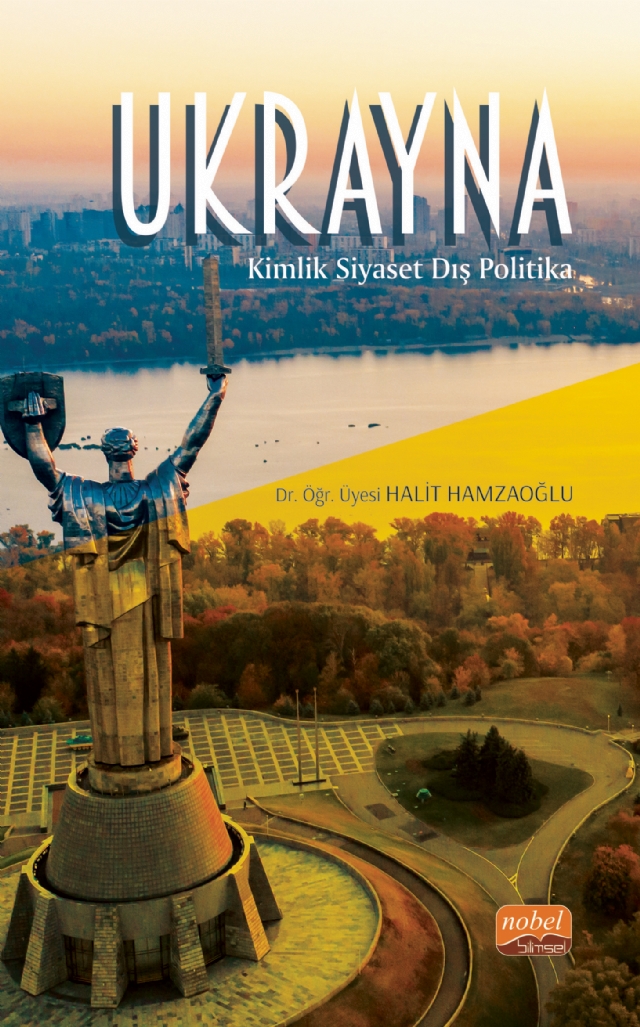
Halkların temas noktasında bulunan Ukrayna coğrafyası, imparatorlukların stratejik ve jeopolitik ihtiraslarının oyun sahalarından birisi olmuştur. Bu çerçevede kimliksel anlamda çeşitli belirsizlikler yaşayan Ukrayna coğrafyası, uzun bir süre ortak aidiyet mekanizmalarını inşa edememiştir. Bu durum birçok ikilemin meydana çıkmasına zemin hazırlamıştır. Bugün Rusya tarafından açık bir saldırıya ve işgale maruz kalan Ukrayna, tarihsel ve jeopolitik ikilemlerin gölgesinde bir varoluş mücadelesi vermektedir. Söz konusu mücadele, teorik olarak uzun vadeli meydan okumaları ihtiva etse de pratikte bir halkın olağan ve anlaşılır bir tepkisi niteliğindedir. Uzun vadeli meydan okumalar ise temelde Avrupa güçler dengesi ile doğrudan ilintilidir.
Ukrayna, günümüz koşullarında, açık bir şekilde Rusya ve Anglosakson jeopolitik bilek güreşinin oyun sahası konumundadır. Bu durum, Ukrayna'nın haklı mücadelesinin meşruiyetini sorgulamayı gerektirmemektedir. Ancak uluslararası siyasetin dinamiklerini kökünden değiştirme potansiyeli, Ukrayna sorununun boyutlarını gözler önüne sermektedir. Ayrıca özellikle Doğu ve Orta Avrupa'daki eski stratejik hesapların ve geniş anlamda jeopolitik kodların yeniden devreye girmesi kaçınılmaz görünmektedir. Bu durumda imparatorluk çağının alışılmış politikalarının belirleyicilik kazanması da öngörülmektedir.
Ukrayna Kimlik Siyaset Dış Politika isimli bu kitap; okuyucuya Ukrayna'nın kimliğini, siyasetini ve dış politikasını teferruatlarıyla anlatmaktadır. Jeopolitik ve tarih arasındaki ilişkinin belirleyiciliğini ortaya koyma gayreti, kitabın kurgusal ve yöntemsel temelini oluşturmaktadır.
Ukrayna, günümüz koşullarında, açık bir şekilde Rusya ve Anglosakson jeopolitik bilek güreşinin oyun sahası konumundadır. Bu durum, Ukrayna'nın haklı mücadelesinin meşruiyetini sorgulamayı gerektirmemektedir. Ancak uluslararası siyasetin dinamiklerini kökünden değiştirme potansiyeli, Ukrayna sorununun boyutlarını gözler önüne sermektedir. Ayrıca özellikle Doğu ve Orta Avrupa'daki eski stratejik hesapların ve geniş anlamda jeopolitik kodların yeniden devreye girmesi kaçınılmaz görünmektedir. Bu durumda imparatorluk çağının alışılmış politikalarının belirleyicilik kazanması da öngörülmektedir.
Ukrayna Kimlik Siyaset Dış Politika isimli bu kitap; okuyucuya Ukrayna'nın kimliğini, siyasetini ve dış politikasını teferruatlarıyla anlatmaktadır. Jeopolitik ve tarih arasındaki ilişkinin belirleyiciliğini ortaya koyma gayreti, kitabın kurgusal ve yöntemsel temelini oluşturmaktadır.

1919 yılında David Davies tarafından kurulan kürsüyle doğduğu kabul edilen uluslararası ilişkiler disiplini, genel olarak yirminci yüzyılın ikinci yarısında olgunlaşmış bir bilim dalıdır. İkinci Dünya Savaşı sonrası savaş, barış, güç, güvenlik ve çıkar eksenli analizleri temel alan disiplin; uluslararası ilişkilerde ekonomi, çoklu aktörler ve sosyokültürel konuları ikincil olarak ele almıştır. Onunla ilişki içinde olan ''uluslararası politik ekonomi''nin yeni bir disiplin dalı olarak çok daha yakınlarda -1970'lerde- ortaya çıktığı söylenebilir. Modern dünyadaki ulusal ve uluslararası siyaset ve ekonomi alanlarının giderek artan ölçüdeki karşılıklı ilişkiler nedeniyle ortaya çıkan yapı, böyle bir bilimsel alana olan ihtiyacı artırmıştır. Bugünün dünyasının sorunlarını anlayabilmek, ekonomi ve siyasetin hem ulusal hem de uluslararası düzeydeki karşılıklı etkileşimini dikkate almayı gerektirmektedir. Bu etkileşimin temeli siyaset ve ekonomi biliminin geleneksel sınırlarının aşılmasıyla kısmen anlaşılabilecektir. Bu bağlamda politik ekonominin Avrasya coğrafyasındaki gelişmeler ışığında değerlendirildiği bu kitabın, alanyazında başucu kitabı olması amaçlanmıştır.
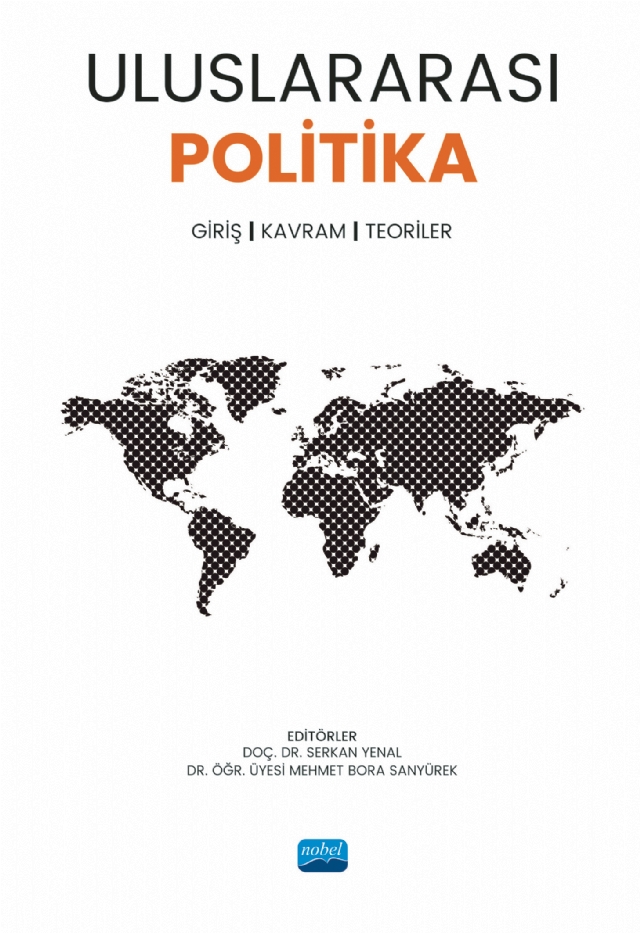
Uluslararası ilişkiler disiplini, yeni bir disiplin olarak değerlendirilmekle beraber Antik Dönem’den beri ulaşılan pek çok metinde, disiplinle ilgili konuların işlendiği görülmektedir. Yazılı antlaşmalar, savaş ve güvenlikle ilgili eserler, ideal devletin nasıl olması gerektiğine ilişkin yazılar gibi pek çok konu, uluslararası ilişkilerin çok eski dönemlerden beri düşünülen ve uygulanan bir alan olduğunu göstermektedir.
Uluslararası ilişkilerin uygulama alanı, sanılanın aksine sadece diplomasi ve devletler değildir. Güvenlikten siyasete, ticaretten sağlığa pek çok konu uluslararası ilişkilerin inceleme konusu hâline gelmiştir. Geçmişte devlet odaklı bir disiplin, günümüzde devletin yanında bireyleri, şirketleri, uluslararası örgütler gibi pek çok hususu inceleme nesnesi hâline getirmiştir.
Uluslararası ilişkilerle ilgili temel kavramlar, uluslararası ilişkiler teorileri, devlet, uluslararası örgütler, jeopolitik teorileri ve Türkiye jeopolitiği konularını içeren kitap, alanda eksikliği hissedilen Türkçe kaynak oluşturmak amacıyla hazırlanmıştır. Bölüm yazarları seçkin üniversite ve kurumlarda görev yapmış ya da hâlen yapmakta olan hocalardan seçilmiş olup bu hocalar, teori ve uygulama tecrübelerini, yazdıkları bölümlere yansıtmışlardır.
Kitap, disipline ilgi duyan öğrenci ve akademisyenlerle birlikte alanda faaliyet gösteren resmî kurum ve özel sektör temsilcilerine, aynı zamanda da genel okuyucuya hitap edecek bir formatta hazırlanmıştır. Kitabın disipline katkı sağlaması dileğiyle…
Uluslararası ilişkilerin uygulama alanı, sanılanın aksine sadece diplomasi ve devletler değildir. Güvenlikten siyasete, ticaretten sağlığa pek çok konu uluslararası ilişkilerin inceleme konusu hâline gelmiştir. Geçmişte devlet odaklı bir disiplin, günümüzde devletin yanında bireyleri, şirketleri, uluslararası örgütler gibi pek çok hususu inceleme nesnesi hâline getirmiştir.
Uluslararası ilişkilerle ilgili temel kavramlar, uluslararası ilişkiler teorileri, devlet, uluslararası örgütler, jeopolitik teorileri ve Türkiye jeopolitiği konularını içeren kitap, alanda eksikliği hissedilen Türkçe kaynak oluşturmak amacıyla hazırlanmıştır. Bölüm yazarları seçkin üniversite ve kurumlarda görev yapmış ya da hâlen yapmakta olan hocalardan seçilmiş olup bu hocalar, teori ve uygulama tecrübelerini, yazdıkları bölümlere yansıtmışlardır.
Kitap, disipline ilgi duyan öğrenci ve akademisyenlerle birlikte alanda faaliyet gösteren resmî kurum ve özel sektör temsilcilerine, aynı zamanda da genel okuyucuya hitap edecek bir formatta hazırlanmıştır. Kitabın disipline katkı sağlaması dileğiyle…
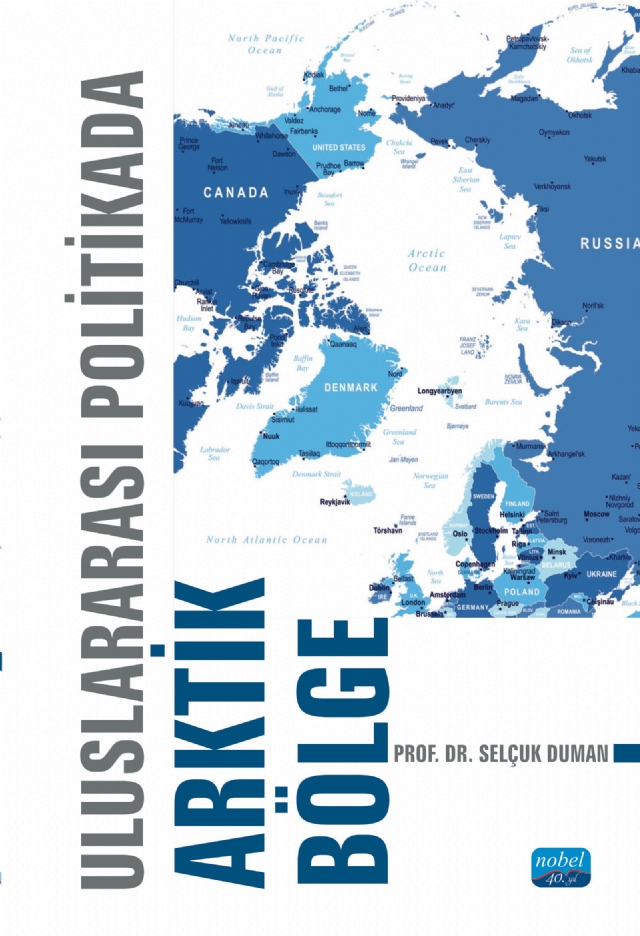
Jeostratejik ve jeopolitik anlamda küresel ölçekte vazgeçilmez olan Arktik Bölge’de buzulların erimesi, permafrostun yumuşaması, daha güçlü dalgalar, erozyon ve kontrol edilemeyen yangın olaylarının artışıyla bölgenin jeopolitiği dönüşüm geçiriyor. Bu gelişmeler, Rusya’yı harekete geçirmiş ve en geniş deniz yetki alanlarına sahip ülke olarak Rusya, kendisini bölgede daha güçlü bir şekilde konumlandırmak için askerî anlamda yoğun bir yığınak ve modernizasyon süreci başlatmıştır. Rusya’nın Arktik Bölge politikalarını ister realizm çerçevesinde ister neoliberal bir yaklaşımla açıklayalım Rus Arktik stratejisinin büyük güç statüsünü yansıtma arzusuna ve bölgenin kırılganlığına dayalı olduğu görülmektedir. Bu strateji; küresel ölçekte siyasi, ekonomik, askerî ve stratejik anlamda önemli bir jeopolitik tartışma ve çatışmanın zeminini hazırlamaktadır. Diğer taraftan Çin, kendisini “yakın ülke” olarak tanımlayarak Arktik Bölge’de her alanda aktif bir oyuncu hâline gelmiştir. Özellikle Rusya ile yaptığı anlaşmalar çerçevesinde, bölgede askerî girişimler de dâhil çok boyutlu bir faaliyet içerisindedir. Bu durum, Arktik Bölge’yi büyük güçlerin jeopolitik çatışma alanına hızla yaklaştırmaktadır. Bu riskin giderek artması beklenebilir çünkü buzulların erimesiyle birlikte ulaşım yollarının daha aktif kullanılması ve keşfedilecek hidrokarbon rezervlerinin çekiciliği, büyük güçler arasındaki rekabeti gittikçe yoğunlaştıracaktır. Ayrıca Atlantik ve Avrupa’nın güvenlik hinterlandı olarak niteleyebileceğimiz Arktik Bölge'deki Rusya-Çin iş birliği, ABD ve Avrupa ülkeleri bakımından son derece riskli olarak nitelendirilmektedir. Hatta bu konuda bazı AB üyeleri tarafından Arktik Bölge; yeni bir mücadele alanı, potansiyel çatışma kaynağı olarak tanımlanmaktadır.
Bu nedenlerden dolayı kitap başlığının Uluslararası Politakada Arktik Bölge olması uygun görüldü. Kitapta; Arktik Bölge'deki jeostratejik ve jeopolitik rekabet, Arktik Bölge Havzası ülkeleri ve diğer ülkelerin yaklaşımları çerçevesinde ele alındı. Birinci Bölüm’de; Arktik Bölge’nin tarihî, coğrafi konumu, stratejik önemi ve sahip olduğu avantajlar incelendi. İkinci Bölüm’de, Arktik Havzası ülkelerinin bölgedeki girişimleri analiz edildi. Üçüncü Bölüm’de başta AB, NATO, Çin, Birleşik Krallık, Almanya, Fransa, Hollanda ve Türkiye olmak üzere diğer ülkelerin Arktik Bölge’yle ilgili politikaları değerlendirildi.
Bu nedenlerden dolayı kitap başlığının Uluslararası Politakada Arktik Bölge olması uygun görüldü. Kitapta; Arktik Bölge'deki jeostratejik ve jeopolitik rekabet, Arktik Bölge Havzası ülkeleri ve diğer ülkelerin yaklaşımları çerçevesinde ele alındı. Birinci Bölüm’de; Arktik Bölge’nin tarihî, coğrafi konumu, stratejik önemi ve sahip olduğu avantajlar incelendi. İkinci Bölüm’de, Arktik Havzası ülkelerinin bölgedeki girişimleri analiz edildi. Üçüncü Bölüm’de başta AB, NATO, Çin, Birleşik Krallık, Almanya, Fransa, Hollanda ve Türkiye olmak üzere diğer ülkelerin Arktik Bölge’yle ilgili politikaları değerlendirildi.
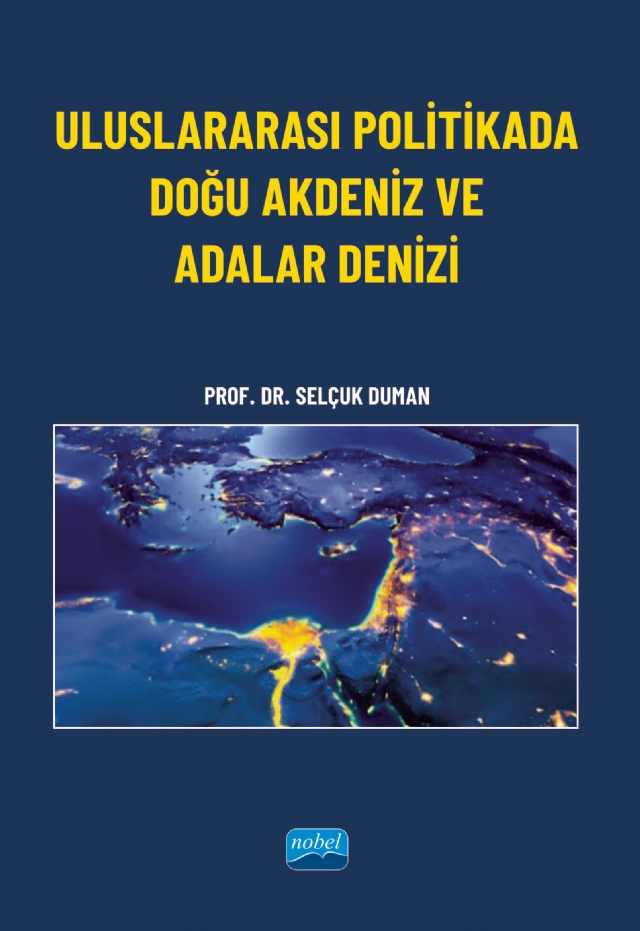
Türkiye'nin ulusal güvenliğini doğrudan ilgilendiren ve uluslararası hukuk çerçevesinde çözümü sağlanamadığı zaman Türkiye'nin ulusal güvenliği için bir tehdit unsuru hâline gelebilecek olan, Doğu Akdeniz ve Adalar Denizi çerçevesinde yaşanan sorunların bir "millî politika" hâline dönüştürülmesi için kuşkusuz günlük siyasal tartışma ve cepheleşmeden uzak somut ve objektif veriler çerçevesinde değerlendirilmesi oldukça önemlidir.
Ayrıca Doğu Akdeniz ve Adalar Denizi özelinde Türkiye'nin çıkarlarının belirli düzeyde öğretilmesi ve benimsenmesi, bu sorunların Türkiye lehinde çözülmesine ciddi katkısı olacaktır.
Özellikle uluslararası ilişkiler ana bilim dalları ve diplomasi ile doğrudan yada dolaylı bağlantılı olan diğer bilim alanlarında okuyan, görev yapan ya da ilgili olan her bireyin Doğu Akdeniz ve Adalar Denizi sorunlarını belirli düzeyde bilmesi, Türkiye'nin çıkarlarının korunması için son derece önemlidir.
Bu gerçeklerden hareketle iki bölüm hâlinde hazırladığımız kitabımız konuyla ilgili tüm başlıkları içermektedir.
Amacımız, güncel gelişmeler ve tartışmaları da göz önüne alarak derli toplu bir bilgilendirme yapmaktır.
Ayrıca Doğu Akdeniz ve Adalar Denizi özelinde Türkiye'nin çıkarlarının belirli düzeyde öğretilmesi ve benimsenmesi, bu sorunların Türkiye lehinde çözülmesine ciddi katkısı olacaktır.
Özellikle uluslararası ilişkiler ana bilim dalları ve diplomasi ile doğrudan yada dolaylı bağlantılı olan diğer bilim alanlarında okuyan, görev yapan ya da ilgili olan her bireyin Doğu Akdeniz ve Adalar Denizi sorunlarını belirli düzeyde bilmesi, Türkiye'nin çıkarlarının korunması için son derece önemlidir.
Bu gerçeklerden hareketle iki bölüm hâlinde hazırladığımız kitabımız konuyla ilgili tüm başlıkları içermektedir.
Amacımız, güncel gelişmeler ve tartışmaları da göz önüne alarak derli toplu bir bilgilendirme yapmaktır.
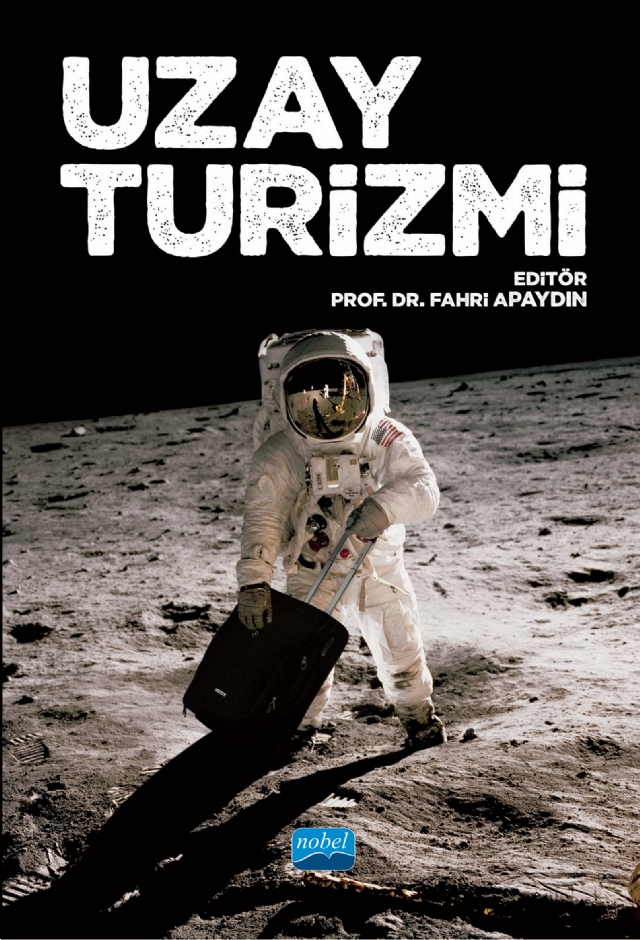
Gizemlerle dolu olan uzay, her zaman insanı büyülemiş ve merakını uyandırmıştır. Çıplak gözle gözlemlemekle yetinmeyip teleskoplar geliştirerek uzayı keşfetmeye çalışan insan, gelişen teknolojilerle biraz daha uzaya yaklaşmış ve onun içine girmeyi başarmıştır. Sadece Dünya'dan uzayı izlemenin ötesinde artık ileri uzay araçları ile uzay yolculukları mümkün hâle gelmiştir. İlk başlarda bilimsel ve belki kısmen de askerî amaçlarla uzaya yolculuklar düzenlenirken artık günümüzde dikkate değer sayıda şirketlerce sivil amaçlı uzay yolculukları gerçekleştirilmektedir.
Macera arayan ve yeni yerler keşfetmek isteyen oldukça çok sayıdaki gelir düzeyi yüksek tüketiciler, düzenlenen uzay yolculuklarına katılarak yeni heyecanlar tatmanın keyfini yaşamaktalar. Tüketicilerin bu yöndeki taleplerini gören şirketler ise bu taleplere cevap vermek için yoğun bir rekabete girmektedir. Bu ise uzay turizminin yani yeni bir sektörün doğmasına ve gelişmesine katkı vermektedir.
Henüz gelişmekte olan uzay turizmini inceleyen bu kitap, ilk olması nedeniyle alana oldukça önemli katkı sunmaktadır. Uzay turizmini kapsamlı bir şekilde inceleyen kitap, uzay turizminin farklı boyutlarına değinerek girişimciler ve uzay konusunda meraklı olan okuyucular için değerli bilgiler sunmakta; Kitap aynı zamanda uzay turizminin potansiyelini de ortaya koyarak şirketlerin bu sektörde nasıl faaliyetler yürütebileceğini de açıklamaktadır.
Macera arayan ve yeni yerler keşfetmek isteyen oldukça çok sayıdaki gelir düzeyi yüksek tüketiciler, düzenlenen uzay yolculuklarına katılarak yeni heyecanlar tatmanın keyfini yaşamaktalar. Tüketicilerin bu yöndeki taleplerini gören şirketler ise bu taleplere cevap vermek için yoğun bir rekabete girmektedir. Bu ise uzay turizminin yani yeni bir sektörün doğmasına ve gelişmesine katkı vermektedir.
Henüz gelişmekte olan uzay turizmini inceleyen bu kitap, ilk olması nedeniyle alana oldukça önemli katkı sunmaktadır. Uzay turizmini kapsamlı bir şekilde inceleyen kitap, uzay turizminin farklı boyutlarına değinerek girişimciler ve uzay konusunda meraklı olan okuyucular için değerli bilgiler sunmakta; Kitap aynı zamanda uzay turizminin potansiyelini de ortaya koyarak şirketlerin bu sektörde nasıl faaliyetler yürütebileceğini de açıklamaktadır.